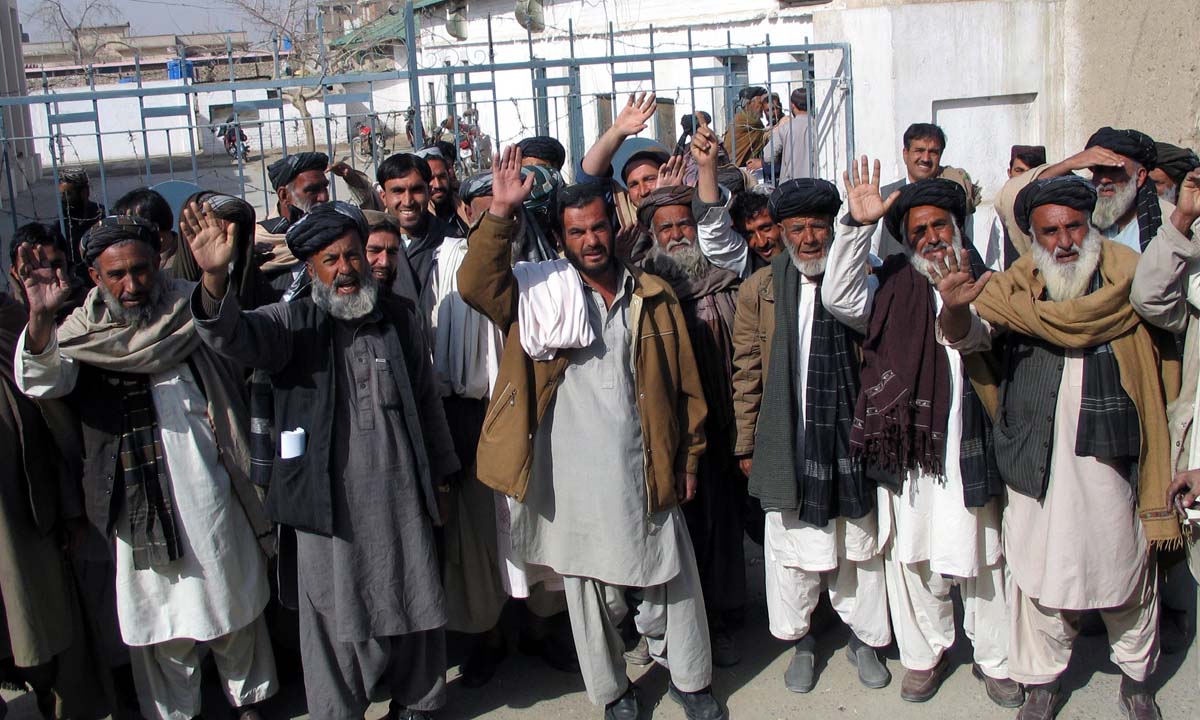Local resident of the Chaman New Abadi protesting in front of the WAPDA House against the 22 hours load-shedding in Pakistani border town Chaman : Photo By NewsLens Pakistan / Matiullah Achakzai
Quetta: Power crises has deepened across Balochistan, Pakistan’s southwest province, in recent weeks following the energy crisis at national level and nonpayment of utility bills by consumers in the province, said spokesperson of Quetta Electricity Supply Company (QESCO), a state-run power distributing company in the province.
People in remote areas of the province like the earthquake affected Awaran had lodged complaints that electricity was available for merely two to three hours a day drastically affecting productivity in business and routine life.
“The people cannot go to offices as the rooms are dark and computers are off due to the prolonged load shedding”, Shabir Rakshani, resident of Awaran city, told News Lens via phone.
The Zamindar Action Committee Balochistan (ZACB), a union of growers, took out a procession in Quetta and protested the prolonged power outages. “The 75 percent people are dependent on agriculture and livestock in the province but the recent increase in the hours of load shedding has badly impacted the crops,” said Abdul Rehman, General Secretary of ZACB. “The tube wells could not be used due to power cuts and there is no water to irrigate lands.”
The growers threatened to intensify their protest, if the power crisis is not addressed immediately.
However, the power crisis has disturbed the routine life of domestic consumers across the province where in the city areas, power outages last six to eight hours. In the remote rural areas, electricity is available only for three to four hours out of the 24.
According to spokesperson of QESCO, only 400 Mega Watt (MW) was being supplied to Balochistan against the total need of 1650 MW. “There is a shortfall of 1250 MW as the National Grid Station is providing merely 400 MW against the total requirement of 1650,” he told News Lens Pakistan. “The crisis has increased after the consumers mainly growers did not pay the outstanding dues of more than one hundred billion rupees, primarily the main defaulters agriculture consumer.”
He said the reduction in electricity supply from National Grid Station is done on the directives of Federal Government.
According to QESCO spokesperson, consumers owe QESCO Rs.132 billion over nonpayment of electricity bills. Out of Rs.132 billion, the agriculture-consumers alone owe Rs. 115 billion. “The growers have tortured and beaten up the officials when they went for recovery and tried to disconnect their connection”, the QESCO spokesperson said.
However, growers like Shoaib Sumalani believe the government should be strict when it comes to outstanding dues.
“I have a tube well to irrigate my fields and we monthly pay the bills,” he said. “There are dozens of illegal connections and many do not pay bills.” Sumalani grows apples and other fruits in the Dasht area in outskirts of Mastung district.
Though the nonpayment of electricity bills is a big issue but even after the payment, the issue would not be resolved permanently. “The hours of load-shedding would reduce after the payment as they have been increased following the directives of Ministry for Water and Power Pakistan,” he said. However, the hours of load-shedding also depend on the energy shortfall in the country.
According to documents available with QESCO, there are four huge power plants in Balochistan that generate around 2300 MW electricity — HUBCO Power has capacity of 1,229 power generation, Habibullah Coastal has capacity of 140 MW, Uch Power Plant one and two has capacity of 900 MW.
However, the electricity first goes to National Grid Station from where it is distributed across Pakistan. “Pakistan generates around 2000 MW electricity while 5 percent is supplied to Balochistan,” spokesperson said.
In his statement about the electricity crisis in the province, Chief Minister Dr. Abdul Malik Baloch said his government has proposed to import 1000 electricity from Iran which will end the crisis permanently.
Iran already provides electricity to Mekran division — Gwadar, Turbat and Panjgur districts that shares border with that country. However, the power requirement for these areas has increased over the past one decade.
The QESCO spokesperson also agreed that importing electricity would resolve this issue. “Two mega transmission lines of 220 KV are under construction which would be soon completed to further reduce the crisis,” he said.
Siddiq Baluch, a Quetta based newspaper editor, says that willful power outages are an injustice to the people of Balochistan.
“Iran has been willing to offer electricity on cheaper price for the past two decades but no one paid any attention,” he said. “I do not think the federal government would take any interest to address the basic issues of Balochistan.”
Baluch believes people in Balochistan are living in the Stone Age with no gas and electricity in major parts.
“The two transmission lines are under construction for years and it would take more time”, he told News Lens. “Similarly, it will take more than a decade to implement any project to import electricity from Iran.”




